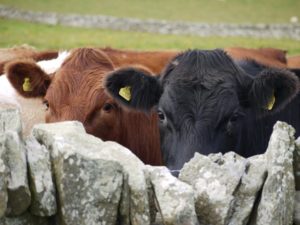More Barren Cows Last Summer?
19 January 2018 It appears that the poor end to the summer has resulted in higher numbers of barren cows compared to normal. A rough estimate from an operator who perhaps scans more cows than anyone else around Scotland is that barren numbers will be around 50% higher compared with normal.
It appears that the poor end to the summer has resulted in higher numbers of barren cows compared to normal. A rough estimate from an operator who perhaps scans more cows than anyone else around Scotland is that barren numbers will be around 50% higher compared with normal.
The other interesting point is that with the high price of straw etc the majority of producers have culled their barren cows ASAP.
What Does This Mean For The Future?
These thoughts relate mainly to Scotland but it is likely that trends will be very similar throughout the UK and Ireland.
- Less calves. Numbers of suckled calves born this spring are likely to be down by up to 5%. This will have an impact on numbers of finished “Scotch” cattle from June 2019 through to winter 2020. Does this make it a useful time to consider rearing calves from the dairy herd, and if prices get too high, using even purebred dairy bulls? These could certainly be purchased cheaply from the increasing number of large block spring calving dairy herds who will start calving from February onwards this year.
- With more barren cows and in particular a higher proportion being slaughtered the national suckler herd is likely to be significantly lower (as shown in the December census?) Does this make it a good year for breeding more heifers with the target of selling them in-calf next autumn or even with calf at foot in a years time?
Alternatively would this be a good year to reduce herd size either short term (or heaven forbid) long term?
- Utilising resources released from a smaller herd size? Reducing herd size by 5% will release significant resources, particularly food, grazing, bedding, shed space, etc. Plan now how these can be utilised eg
- Keep more heifers to breed as replacements for sale.
- Take the opportunity to reseed a grass field.
- Consider reseeding under a cereal crop which, if necessary could be harvested as wholecrop for feeding.
- Consider keeping more straw under cover – but make sure it does not mess up the ventilation for stock.
Basil Lowman, SAC Consulting Beef Specialist
Sign up to the FAS newsletter
Receive updates on news, events and publications from Scotland’s Farm Advisory Service
